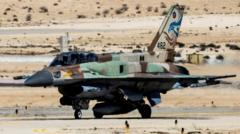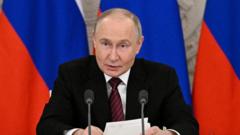The recent Israeli airstrikes targeting multiple military sites in Syria signal a volatile interaction between these regional powers, complicating Syria's recovery.
Israel-Turkey Rivalry Intensifies Amid Syrian Conflict

Israel-Turkey Rivalry Intensifies Amid Syrian Conflict
Escalating tensions between Israel and Turkey over influence in Syria threaten the stability of the newly-formed Syrian government.
Israel has heightened military activity against Turkish interests in Syria, leading to severe backlash and accusations from both sides. On Wednesday night, the Israeli military struck several locations within Syria, including the Hama military airport and the T4 base close to Homs. According to Syria's foreign ministry, the airstrikes have caused significant damage, reportedly rendering the Hama airport nearly inoperable. It was reported that four defense officials were killed, and many others were wounded in the attack.
This military action appears to serve dual purposes: affecting Syrian military capacity while simultaneously sending a message to Turkey. Almost immediately following the strikes, Israel's Foreign Minister condemned Turkey's involvement in Syria as detrimental, while the Israeli Defense Minister warned Syria's interim leader, Ahmed al-Sharaa, of serious repercussions should "hostile forces" be allowed entry into Syria.
Turkey is actively negotiating a defense pact with Sharaa's administration and has received reports of Turkish military preparations to station troops and equipment at Syrian airbases, including T4 and Aleppo. Analysts note the intensity of Israel's recent bombings reflects a calculated response to perceived Turkish military advancements.
Tensions have only worsened since the recent Gaza conflict, with Turkey imposing trade restrictions on Israel and condemning its military actions as "genocide." In response, Turkey's foreign ministry accused Israel of threatening regional stability and promoting terrorism while asserting that Turkey is not pursuing confrontation with Israel.
Amid these tensions, Syria's new leadership has expressed intentions to forge peaceful relations with its neighbors, indicating a preference for stability and diplomacy rather than conflict. However, Israel’s military role in the region complicates these efforts, with ongoing strikes targeting military assets belonging to both the new government and emerging jihadist factions.
Syria's internal unrest remains an obstacle, fueled by historical sectarian divisions that began under the former regime. Recent violence in the coastal regions has exacerbated these fractures.
Despite the shift in Syria’s political landscape, many Syrians express disappointment towards Israel's continued military aggression, with opinions turning against Israeli actions, suggesting they see Israel as a threat to the Syrian populace. The challenging path toward stability in Syria could lead to renewed conflict, as regional players act in their interests amidst a fragile post-Assad era.
This military action appears to serve dual purposes: affecting Syrian military capacity while simultaneously sending a message to Turkey. Almost immediately following the strikes, Israel's Foreign Minister condemned Turkey's involvement in Syria as detrimental, while the Israeli Defense Minister warned Syria's interim leader, Ahmed al-Sharaa, of serious repercussions should "hostile forces" be allowed entry into Syria.
Turkey is actively negotiating a defense pact with Sharaa's administration and has received reports of Turkish military preparations to station troops and equipment at Syrian airbases, including T4 and Aleppo. Analysts note the intensity of Israel's recent bombings reflects a calculated response to perceived Turkish military advancements.
Tensions have only worsened since the recent Gaza conflict, with Turkey imposing trade restrictions on Israel and condemning its military actions as "genocide." In response, Turkey's foreign ministry accused Israel of threatening regional stability and promoting terrorism while asserting that Turkey is not pursuing confrontation with Israel.
Amid these tensions, Syria's new leadership has expressed intentions to forge peaceful relations with its neighbors, indicating a preference for stability and diplomacy rather than conflict. However, Israel’s military role in the region complicates these efforts, with ongoing strikes targeting military assets belonging to both the new government and emerging jihadist factions.
Syria's internal unrest remains an obstacle, fueled by historical sectarian divisions that began under the former regime. Recent violence in the coastal regions has exacerbated these fractures.
Despite the shift in Syria’s political landscape, many Syrians express disappointment towards Israel's continued military aggression, with opinions turning against Israeli actions, suggesting they see Israel as a threat to the Syrian populace. The challenging path toward stability in Syria could lead to renewed conflict, as regional players act in their interests amidst a fragile post-Assad era.





















